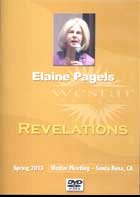
Revelations 2012
Distributed by Westar InstituteWillamette University, 900 State Street, Salem, OR 97301; 503-375-5323
Producer n/a
Director n/a
DVD,
College - General Adult
Christianity, Judaism, History
Date Entered: 05/21/2014
Reviewed by Sandra Collins, Byzantine Catholic Seminary Library, Pittsburgh, PAElaine Pagels, Harrington Spear Paine Foundation Professor of Religion at Princeton University, here presents some of the major arguments found in her book, Revelations: Visions, Prophecy, and Politics in the Book of Revelation (2012) at the Spring 2012 meeting of the Westar Institute. Like several other New Testament scholars, Pagels persuasively demonstrates how Revelation can be read as a scathing attack on the oppression and moral decay of Rome. Its author, John of Patmos, can be seen as writing in the aftermath of the Jewish War in 66 CE, when militant, religiously zealous Jews in Jerusalem, waged an all-out war against Roman occupation and cruelty. Rome’s ensuing and sure defeat of the Jews resulted in Jerusalem’s horrific destruction and, more troubling, its desecration of the Temple, the resting place of YHWH. However, later, according to Pagels, early Christianity reinterpreted Revelation and employed its mystifying arcane prophecies as a symbolic blueprint intended to identify and root out heresy. As a matter of course, this included Jews, but eventually extended to dissenting or non-normative Christian theologies. Eventually, increasingly rigid doctrines and hierarchies worked to define the boundaries of orthodox, or right believing, Christianity, to the detriment of non-canonical works now deemed heretical.
Pagels is an engaging speaker who uses visuals as well as her considerable knowledge of early Christianity to make for a dynamic, stimulating presentation. Included with her presentation is a question-and-answer period from the floor that also includes insights from Michael T. White, moderator. She has an admirable ability to answer questions both simply and directly. Those who disagree with Pagels’ more liberal historical findings will view this as an assault on mainstream orthodox theologies. Those who are more interested in ancient history than theology will find much to ruminate upon here.